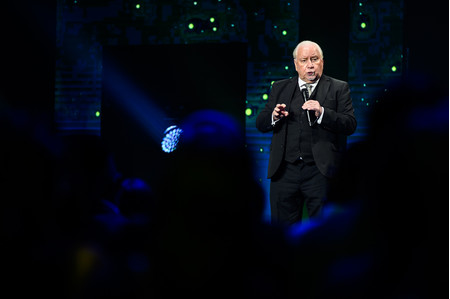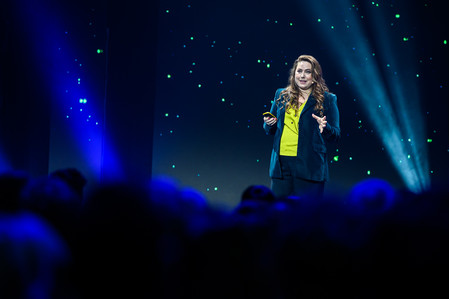Ray Hammond, a futurist for more than 35 years, has been making accurate predictions about future trends in Europe for a uniquely long time – and now he is living in the future he first described three decades ago. For years, he’s been studying the impact of new technologies on various industries and trends in society, from finance and health to leisure and mobility. In his presentation, he spoke about the trends shaping our lives in the coming decades and beyond, as well as their relationships, including the key future technologies that will be based on the networks that Yettel is developing.
One of these trends is population growth: the UN estimates that the world’s population will reach eight billion people on 18 November. In the next decades, the number of people for whom the Earth will need to provide shelter, food, water and energy will grow by billions. Unlike others, Hammond does not see this as a terrible scenario. He believes that our planet can sustain many more people than that. “The end of the world will not happen, but the challenges are huge: the children born now will consume three to four times more energy than we do.”
We will definitely face extreme weather events in the next three to four decades, even if we could get rid of all carbon emissions in one go. Today’s extreme weather events can be traced back to emissions in the 1990s. Humanity is in a period of transition from fossil fuels to renewables. Hammond says the key issue here is to find renewable energy that can be stored at a reasonable cost. The futurist believes that in about 30 years we can satisfy a large proportion of our energy needs in this way.
According to Hammond, we are now in the second phase of globalisation. We are getting over the practice of the 1990s where manufacturing was shifting from developed countries to developing countries because of low labour costs. Cheap labour is becoming increasingly scarce. Some developing countries can no longer be considered “developing”, because the first phase of globalisation lifted some two billion people out of extreme poverty. As a result, many activities return to developed countries, and the trend of driving down costs in easy-to-do jobs through the use of robotics has emerged. This could make a difference in jobs of increasing complexity at higher and higher levels as AI advances.
The most dramatic developments are in medicine and healthcare, he claims. Profound technical and scientific changes will pave the way for DNA profile-based personalised treatments in the next few years. This era will be defined by technologies that operate on high-performance networks, enabling healthcare to function as a distributed technology platform. Hospitalisation will be supported by wearable sensors, allowing health data to be shared instantly with physicians or the hospital. “This will not make human work redundant. In fact, physicians, nurses and carers will be able to spend more time with patients.”
The exponential growth of technology will continue. High-performance networks – 5G and later 6G – are not so much needed by humans as by machines. “Technology growth is driven by the increase in network speeds. Superfast smart grids will enable the development of applications that we cannot yet imagine. No matter how controversial this statement may seem, but connected robots working in a vast array of industries and fields will generate prosperity we have never seen before.”
Will these robots take the jobs of humans? Research shows that if we liberate people from boring, repetitive work, they will spend their time doing useful things, Hammond believes. “I think technology used purposefully opens up wonderful prospects."
Judit Polgár is an international chess grandmaster, the best female player in chess history, the first – and so far, the only – woman to be ranked in the top ten of the world’s chess rankings. She retired from competitive chess in 2015. Her “specialty” was beating world champions. She has beaten eleven men’s world champions in classical or rapid chess. This summer, she beat 32-year-old Norwegian world chess champion Magnus Carlsen.
At the Yettel Connect event, Judit Polgár talked about the versatility of strategy making using the analogy of chess. She recalled the journey she has taken since winning her first competitions as a child, always with the goal of becoming a champion among men in a male-dominated sport. She also talked about how she used different strategies against different opponents, and how she prepared for her game with chess legend Garry Kasparov, making the necessary sacrifices to turn her opponent’s energy and tactics against him.
“The Yettel Connect business event featured renowned speakers and innovative exhibitors, accompanied by our successful Hack It Your Way developer competition. As a mobile operator, our commitment to progress and quality relationships is reflected by the way we use advanced technology and open knowledge sharing to help businesses become digitised and connect them with the partners that matter to them. This event was also an opportunity for quality dialogue,” said Mohamed ElSayad, Chief Commercial Officer of Yettel Hungary.


